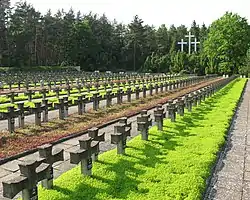Palmiry | |
|---|---|
Village | |
 Cemetery in Palmiry | |
 Palmiry | |
| Coordinates: 52°22′N 20°47′E / 52.367°N 20.783°E | |
| Country | |
| Voivodeship | Masovian |
| County | Nowy Dwór |
| Gmina | Czosnów |
| Population | 220 |

Palmiry ([palˈmirɨ]) is a village in the administrative district of Gmina Czosnów, within Nowy Dwór County, Masovian Voivodeship, in east-central Poland.[1] It is located at the edge of the Kampinos Forest, approximately 4 kilometres (2 mi) south-east of Czosnów, 11 km (7 mi) south-east of Nowy Dwór Mazowiecki, and 23 km (14 mi) north-west of Warsaw. In 2000 the village had an approximate population of 220.
Mass executions during German occupation of Poland
During World War II, between 1939 and 1943, the village and the surrounding forest were one of the sites of the Nazi German mass executions of Jews,[2] Polish intelligentsia, politicians and athletes, killed during the German AB-Aktion in Poland. Most of the victims were first arrested and tortured in the Pawiak prison in Warsaw, then transferred to the execution site. In total, about 1,700 Poles were murdered there in secret executions between December 7, 1939 and July 17, 1941.
In 1946, the bodies were exhumed and reburied in a new cemetery, situated approximately 5 kilometres from the village itself. The reburial site has been a Polish national mausoleum since 1948.
References
- ↑ "Central Statistical Office (GUS) – TERYT (National Register of Territorial Land Apportionment Journal)" (in Polish). 2008-06-01.
- ↑ Gilbert, Martin (1987). The Holocaust: A History of the Jews of Europe During the Second World War. Macmillan Publishers. p. 112. ISBN 978-0-8050-0348-2.
External links
![]() Media related to Palmiry at Wikimedia Commons
Media related to Palmiry at Wikimedia Commons
- Jewish Community in Palmiry on Virtual Shtetl
